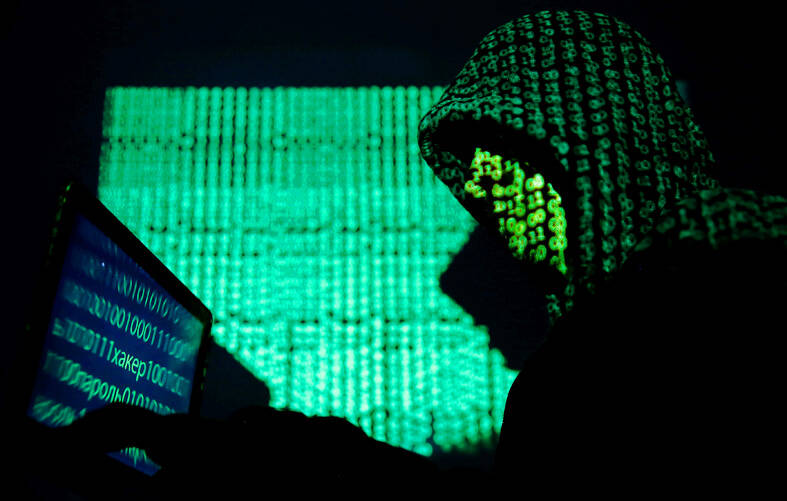A recent spate of blackmail incidents using “deepfake” photographs and videos to extort medical personnel and academics originated in China, the Taipei Police Department said yesterday, while the Ministry of Justice Bureau of Investigation (MJIB) reported an election-focused use of manipulated video.
Male medical personnel at Taipei City Hospital reported to police on July 19 that they had received e-mails containing black-and-white images of them in a bed embracing a woman.
The e-mail warned the recipient to keep a low profile and contact an individual through Line, or a video of them would be released, the police said.

Photo: Reuters
The Taipei Police Department’s Criminal Investigation Division said that the Internet protocol addresses associated with the e-mails and the Line chats originated from China and Hong Kong.
The investigation also showed that lecturers at National Tsing Hua University and National Cheng Kung University have also reported receiving similar e-mails threatening to publicize the photographs in March.
The police said they have forwarded the matter to prosecutors’ offices and are also launching a broader investigation into similar incidents.
Meanwhile, cybersecurity experts say the ready availability of candidates’ photos and videos combined with easy access to photo, video and voice-manipulation technology could pose a security risk if groups create and spread false photos and videos online ahead of January’s elections.
Prosecutor-General Hsing Tai-chao (邢泰釗) last week said that the Supreme Prosecutors’ Office has instructed district prosecutors’ offices across the nation to establish a task force to handle false information generated using artificial intelligence or deepfake technology.
The Ministry of Justice Bureau of Investigation yesterday said that a video clip recently circulated on social media allegedly featuring Vice President William Lai (賴清德), the Democratic Progressive Party’s presidential candidate, was altered with deepfake technology.
In the video, “Lai” says: “I must stress that regardless of the blue or white camps, they are all political parties representing mainstream public opinions.”
The bureau said it is still investigating the issue, adding that spreading or streaming clips, videos or sounds involving presidential candidates that have been altered by deepfake technology contravenes the Presidential and Vice Presidential Election and Recall Act (總統副總統選舉罷免法).
Members of the public should verify information before they share it online to avoid inadvertently contravening the law, it said.

‘DENIAL DEFENSE’: The US would increase its military presence with uncrewed ships, and submarines, while boosting defense in the Indo-Pacific, a Pete Hegseth memo said The US is reorienting its military strategy to focus primarily on deterring a potential Chinese invasion of Taiwan, a memo signed by US Secretary of Defense Pete Hegseth showed. The memo also called on Taiwan to increase its defense spending. The document, known as the “Interim National Defense Strategic Guidance,” was distributed this month and detailed the national defense plans of US President Donald Trump’s administration, an article in the Washington Post said on Saturday. It outlines how the US can prepare for a potential war with China and defend itself from threats in the “near abroad,” including Greenland and the Panama

A wild live dugong was found in Taiwan for the first time in 88 years, after it was accidentally caught by a fisher’s net on Tuesday in Yilan County’s Fenniaolin (粉鳥林). This is the first sighting of the species in Taiwan since 1937, having already been considered “extinct” in the country and considered as “vulnerable” by the International Union for Conservation of Nature. A fisher surnamed Chen (陳) went to Fenniaolin to collect the fish in his netting, but instead caught a 3m long, 500kg dugong. The fisher released the animal back into the wild, not realizing it was an endangered species at

The High Prosecutors’ Office yesterday withdrew an appeal against the acquittal of a former bank manager 22 years after his death, marking Taiwan’s first instance of prosecutors rendering posthumous justice to a wrongfully convicted defendant. Chu Ching-en (諸慶恩) — formerly a manager at the Taipei branch of BNP Paribas — was in 1999 accused by Weng Mao-chung (翁茂鍾), then-president of Chia Her Industrial Co, of forging a request for a fixed deposit of US$10 million by I-Hwa Industrial Co, a subsidiary of Chia Her, which was used as collateral. Chu was ruled not guilty in the first trial, but was found guilty

DEADLOCK: As the commission is unable to forum a quorum to review license renewal applications, the channel operators are not at fault and can air past their license date The National Communications Commission (NCC) yesterday said that the Public Television Service (PTS) and 36 other television and radio broadcasters could continue airing, despite the commission’s inability to meet a quorum to review their license renewal applications. The licenses of PTS and the other channels are set to expire between this month and June. The National Communications Commission Organization Act (國家通訊傳播委員會組織法) stipulates that the commission must meet the mandated quorum of four to hold a valid meeting. The seven-member commission currently has only three commissioners. “We have informed the channel operators of the progress we have made in reviewing their license renewal applications, and